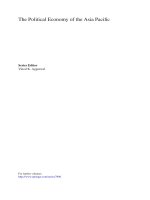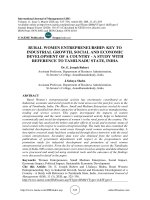Economic growth and economic development 528
Bạn đang xem bản rút gọn của tài liệu. Xem và tải ngay bản đầy đủ của tài liệu tại đây (105.21 KB, 1 trang )
Introduction to Modern Economic Growth
side of the economies represented by the aggregate production function
(11.21)
Y (t) = F (K (t) , H (t)) ,
where H (t) denotes efficiency units of labor (or human capital), which will be accumulated in the same way as physical capital. We assume that the production
function F (·, ·) now satisfies our standard assumptions, Assumptions 1 and 2.
Suppose that the budget constraint of the representative household is given by
(11.22)
a˙ (t) = (r (t) − n)a (t) + w (t) h (t) − c (t) − ih (t) ,
where h (t) denotes the effective units of labor (human capital) on the representative
household, w (t) is wage rate per unit of human capital, and ih (t) is investment in
human capital. The human capital of the representative household evolves according
to the differential equation:
h˙ (t) = ih (t) − δ h h (t) ,
(11.23)
where δ h is the depreciation rate of human capital. The evolution of the capital
stock is again given from the observation that k (t) = a (t), and we now denote
the depreciation rate of physical capital by δ k to avoid confusion with δh . In this
model, the representative household maximizes its utility by choosing the paths of
consumption, human capital investments and asset holdings. Competitive factor
markets imply that
(11.24)
R (t) = f 0 (k (t)) and w (t) = f (k (t)) − k (t) f 0 (k (t)) ,
where, now, the effective capital-labor ratio is given by dividing the capital stock
by the stock of human capital in the economy,
K (t)
.
k (t) ≡
H (t)
A competitive equilibrium of this economy consists of paths of per capita consumption, capital-labor ratio, wage rates and rental rates of capital, [c (t) , k (t) , w (t) , R (t)]∞
t=0 ,
such that the representative household maximizes (11.1) subject to (11.3), (11.22)
and (11.23) given initial effective capital-labor ratio k (0) and factor prices [w (t) , R (t)]∞
t=0
that satisfy (11.24).
To characterize the competitive equilibrium, let us first set up at the currentvalue Hamiltonian for the representative household with costate variables µa and
514









